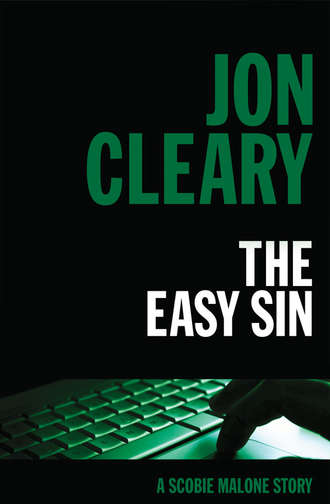
Полная версия
The Easy Sin
There was a gurgling sound from Kylie Doolan, like the last of the bathwater going down the plughole.
4
‘We split up six years ago, in London,’ said Caroline Magee.
‘You’re English?’ asked Malone.
‘No.’ But the vowels had been rounded, she would never sing ‘Tie Me Kangaroo Down, Sport’. ‘We met there, were married for two years. I’m from Coonabarabran.’
Bush country: but she had brushed off the bindi-eyes and the paddock dust and the slow country drawl. She was a dark auburn version of Kylie Doolan, just a little sleeker, more sophisticated looking. But her eyes were large and frank, if still puzzled.
Malone had explained to her what had happened in the apartment. She had listened without comment, then just shaken her head. Whether in disbelief or expectation, it was hard to guess. But she did not crumble.
‘Have you been in touch with your husband lately?’
‘Yes, over the past couple of months.’
‘Shit!’ said Kylie Doolan.
Up till now neither woman had spoken to each other; indeed, Caroline Magee had hardly looked at Kylie Doolan. Malone, wiser than he played in the ways of women, had held off introducing the two till he saw how far the wife would undermine the girlfriend. He had learned a lot from an observant wife and two sharp-eyed daughters. A cop, he had also learned, could surround himself with less helpful company.
Caroline Magee looked at Kylie. ‘And you are the girlfriend?’ She made girlfriend sound like bimbo. The rounded vowels had spikes, like deep-sea mines.
Paula Decker and John Kagal sat silent; they had seen this before, but it was always worth attention. Women at odds with each other are more interesting than men in the same situation. There is more subtlety; or there was in this case. These two had been in training, though neither had known of the other.
‘Yes. We’ve been together quite a while. Here.’ Kylie looked around, staking out her claim, even though the lease had been cancelled. In, it seemed, more ways than one. ‘He never mentioned you.’
‘That’d be Errol. He always played things close to his flat little chest. Or has he put on weight?’
‘You don’t sound as if you’ve come back to – to take up with him again.’ Kylie’s tone also had spikes.
‘No. He asked me to come back to help him.’
‘In what way?’ asked Kagal.
‘I’m a computer software specialist. I taught Errol all he knows.’ She was sitting on an upright chair, her knees together, her hands holding her handbag on her lap. Yet there was no prim stiffness to her, she looked totally relaxed.
‘You knew he was in trouble?’ said Kagal.
There was a slight hesitation. ‘Yes.’
Kagal looked at Kylie Doolan. ‘You knew, too?’
She had her hesitation. ‘Ye-es.’
‘Well, you have that in common.’ Paula Decker had been silent up till now. She sounded as if she was unimpressed by both women. ‘And Errol, too, of course.’
Caroline Magee looked at her. ‘My interest in my husband is purely business. Or was.’
Kylie snorted, but Mrs Magee just ignored her.
Malone said, ‘Where are you staying? Or were you planning to stay here?’
‘No, she is not staying here!’ Kylie had sat up as if she had been bitten by a spider or something else less welcome than Mrs Magee. ‘No, no!’
‘Of course not.’ Caroline Magee’s smile could have sliced rock. ‘I’m at the Ritz-Carlton, just up the road. Errol booked me in there,’ she added. ‘He wanted me close by.’
Malone could taste the sweet-and-sour. ‘Detective Kagal will escort you back there. You can tell Mrs Magee how much Sydney has changed in the time she’s been away, John.’
‘It’ll be a pleasure,’ said Kagal, who was the only one to have caught Malone’s wink.
Caroline Magee stood up. ‘You truly don’t know where Errol is?’
‘No, we don’t know,’ said Malone. ‘I’m hoping he may call you at the Ritz-Carlton. You’ll let us know, of course.’
‘Of course.’ She had an elegance to her that Kylie Doolan, no matter how many designer labels she wore, would never have. She had come a long, long way from Coonabarabran. ‘Am I going to be under police surveillance?’
Malone wondered what she knew about police surveillance. ‘Not unless you ask for it.’
‘No, thank you.’ She gave Kylie Doolan another false smile. ‘Nice meeting you, Miss Doolan. Pity it’s all over.’
She left with John Kagal. The PE team had moved out, the Crime Scene tapes were up, there were only two uniformed officers, Paula Decker and Malone left. And Kylie Doolan.
‘What a bitch!’ said Kylie.
‘Errol really never mentioned her?’ said Paula Decker.
‘Never!’ Kylie looked as if she was about to shiver apart with anger. ‘How could he be so – so –’
‘I think you’d better move out of here,’ said Malone. ‘For a night or two, anyway. Have you got someone you can stay with?’
Kylie looked around the room, then back at Malone. ‘Yes, my sister. She lives out at Minto.’
Ultima Thule of the suburbs: about as far from these Circular Quay apartments as one could get. ‘We’ll get a police car to take you out there. We’ll keep in touch. And if Errol gets in touch –’
‘Out at Minto?’ She pushed the suburb off the edge of the world. Malone wondered if Errol Magee knew as little about Kylie as she had known about him. ‘He’ll call here if he’s going to get in touch with me.’ She waved an angry hand, as if she suddenly hated (or was afraid of) the big apartment. ‘There’s a phone in every room with an answering machine – you noticed? Bloody computers with e-mail and faxes … The bastard!’
‘Take care, Kylie.’
Malone nodded for Paula Decker to follow him to the front door. ‘Get on to your boss, ask him to set up a watch on the switchboard at the Ritz-Carlton, in case Errol calls. They’ll probably nominate a strike force, your command will be running it.’
‘Are you staying on the case?’
He grinned wryly. ‘We’ll see. I think there are too many complications in this one for a simple-minded Homicide man.’
‘I’d like to transfer to Homicide.’
He didn’t ask why; he suddenly felt old and tired. ‘Good luck.’
He left her and went home to Randwick, where there was no computer, no e-mail, no fax, only Lisa. Oh yes, there was Tom, his son, and he had a computer in his room; but Malone never looked at it, avoided it as if any virus it contained was the Ebola strain. There were the two mobile phones, without which no home today was completely furnished, but he looked on them as infectious. He consoled himself with the thought that he belonged to the last century, the further back in it the better. He wallowed in technology atavism.
He wondered if Errol Magee, linked to his world with every conceivable communication, would be heard from again.
Chapter Two
1
Shirlee Briskin was neat: everyone said so. Her blonde hair, her features, her dress: a neat package, said her doctor, a lecher, and her chiropodist, a lesbian lecher, swooned over her neat feet. In her house there was a place for everything and everything was in its place, or you’d better look out. In other people’s houses she straightened the pictures on their walls. Her daughter Darlene, a cynic, told her she should have gone into government: she’d have had the country shipshape in no time.
Shirlee was also utterly amoral, though neat about it. She had not been innocent from the day she had first walked; she had gone from bad seed to full bloom in one step. She had learned the Seven Deadly Sins at convent school and thought them an ideal design for living. Her entire lack of morals and scruples was, in its own way, a sort of innocence. Or so she liked to think, when she thought of morals and scruples at all.
‘What the devil got into you?’ Her vocabulary, too, was neat; she never used four-letter words. ‘How could you mistake a man for a girl?’
‘Mum, it was fucking dark in the room –’
‘Wash your mouth out.’
Corey Briskin sighed. He loved his mother in an off-hand sort of way, but you always had to be careful of the landmines of her temper. She, with some help, had planned the kidnapping of Errol Magee’s girlfriend, but, like a good general, she had not come to the scene of the action.
‘And that girl,’ said Shirlee. ‘Their maid, she’s dead.’
‘You were the one’s been watching everything. You said she only came in during the day.’
‘It was an accident, Mum.’ Phoenix Briskin, without his ski-mask, wouldn’t have attracted attention. He had such a plain face Shirlee sometimes wondered what she had been thinking about when she had conceived him. He had a thick neck and shoulders that could have carried an ox-yoke. ‘She was gunna scream the house down if Corey hadn’t clocked her.’
Shirlee looked at Darlene. ‘Who was the bloke you said you saw come into the flat?’
‘Got no idea,’ said Darlene. ‘All I could see was that he was wearing gloves. On a summer night, if you’re wearing gloves, you’re up to no good.’
‘Corey was wearing gloves,’ said Phoenix. ‘So was I. Medical ones.’
‘Pull your head in,’ said his brother wearily. The resemblance between them was so faint one could be mistaken. Corey had a pleasant face, except for a certain caution about the eyes, as if he trusted no one. He was slim without being skinny and, where his brother was flat-footed, he moved with a certain grace. ‘What we gunna do with Mr Magee? Can you ask a guy to pay for his own kidnapping?’
‘Why not?’ said Darlene, who had gone further at school than her brothers. ‘There are self-funded retirees. Here’s a self-funded kidnappee.’
‘Let’s talk sense,’ said Shirlee, never without a supply of brass tacks.
They had brought Errol Magee, still drugged, to this house eighty kilometres south of Sydney. It was a timber house with a corrugated-iron roof, a turn-of-the-previous century relic; it stood in two hectares of partly-cleared, partly-timbered land that had somehow escaped developers and city folk looking for a weekend hideaway. Clyde Briskin, now dead by his wife’s steady hand, had inherited it from his parents, who had inherited it from their parents. Clyde, though a drunk and a philanderer when he was not holding up service stations or in jail, had been a sentimentalist. In his will he had inserted a clause, as had been in his parents’ and grandparents’ wills, that the property was never to be sold. Shirlee, no sentimentalist, had nominated it as one of her reasons for poisoning him with fox bait.
Now she was glad they had not been able to sell the house. It was an ideal hideaway; there were no neighbours for at least a kilometre on either side. The road that ran past the property was a dirt track that led to a dead end against the Illawarra escarpment. Errol Magee could have disappeared off the face of the earth.
‘I think you and me should talk to Mr Magee,’ said Darlene. She was better-looking than her mother, but not a neat package; there was always the suggestion that something, physically or emotionally, was going to break out of her. But she had control, something else she had inherited from her mother. She worked for a bank, where control is endemic. ‘We’ll see how much he values himself.’
‘Let me and Corey do it,’ said Phoenix. ‘We can scare the shit outa him –’
‘Darlene and me can do that,’ said his mother. ‘Wash your mouth out. Here, Darlene, put this on.’
She had planned everything, even to the calico hoods to be worn when they were with Magee. They were pale blue, with round holes for eyes and mouth. ‘Very chic,’ said Darlene, slipping a hood over her head. ‘Does it go with my yellow shirt?’
‘Cut the crap,’ said Corey, ‘and get in there and tell him what our price is.’
Errol Magee was feeling sick: with the smell of the chloroform in his nostrils and with fear. Early this morning two hooded men had come into this room and taken him to the toilet, where everything had gushed out of him. They had brought him back here to the kitchen chair in this bedroom and rebound him with the brand-new leather straps. They had not spoken to him, just ignoring him when he had asked why the hell he was here. Then he had been left alone till now.
He looked up in surprise when the two women, hooded as the men had been, came into the room. He had heard voices somewhere at the back of the house, but he had not been able to tell how many there were.
‘Mr Magee,’ said Shirlee, nailing brass tacks to the floor, ‘let’s talk business.’
‘Business? What sort of business?’ His voice was a croak. His hands, bound together by a strap, were in his lap. In his blue dress, his knees bound together, he looked demure.
‘Well,’ said Darlene, ‘we made a mistake, Mr Magee. We meant to take your girlfriend, not you. Do you usually mope around the house in drag at night?’
Magee felt even sicker, with embarrassment. ‘No. No, of course not! It was – it was a joke, I was fooling around … What’s going on, for God’s sake?’
‘We’ve kidnapped you,’ said Shirlee. ‘For money. Five million dollars.’
‘American,’ said Darlene, who knew the exchange rate. ‘Not Australian.’
Magee looked at them; but the hoods were blank. ‘You’ve gotta be kidding! I’m broke – skint –’
He was still sick with fear; but he was a good actor. He wouldn’t tell them about the money hidden away overseas, not till they held a gun at his head and threatened to kill him. At the moment they were just talking a deal.
‘Mr Magee,’ said Shirlee patiently, ‘you are worth seventy million dollars –’
‘On paper,’ said Darlene. ‘Australian.’
‘Christ, that was twelve months ago! Don’t you read the papers?’ But he had forgotten. There had been only rumours, buried away in financial columns, nothing in the headlines. He began to regret his closed mouth. ‘My company is going into receivership –’
The two hoods turned towards each other. Then Darlene looked back at him. ‘We’re not financial wizards, Mr Magee, but do you expect us to believe you could lose that much money in twelve months?’
He was dealing with financial idiots; or anyway, infants. He could feel his fear subsiding; a little expertise can stiffen a spine. ‘Ladies –’
‘Cut out the bullshit,’ said Darlene.
Her mother’s hood looked at her, but said nothing.
‘Ladies, in IT –’
‘What’s that?’ said Shirlee.
‘Information Technology.’ They were idiots, no doubt about it. ‘In IT fortunes were made overnight. On paper, that is. And the millionaires went broke overnight. Throats are cut every day of the week. They started cutting my throat three months ago.’
‘Who’s they?’ asked Shirlee.
‘I’d rather not say –’
‘Mr Magee,’ said Darlene, I know what you say is true, about all those paper millionaires. But I don’t think you are one of them. But for the record, who’s been trying to cut your throat?’
‘Are you in the game? IT?’
‘No. But I’m not dumb, Mr Magee.’
He hesitated. It had disconcerted him to have these two women apparently running this kidnapping. He had felt threatened by the two silent men, but these two women, especially the older one, if she was the older one, had their own menace. He had never felt really safe with women, not with Caroline and the women between her and Kylie, but he had never felt threatened by them.
‘The people who put up the venture capital. The Kunishima Bank, they’re Japanese.’
‘A bank is cutting your throat?’ said Shirlee.
‘Banks are expert at it,’ said Darlene. ‘You mean, Mr Magee, you’ve been playing funny buggers and the bank is foreclosing?’
‘Something like that.’
‘Not good enough,’ said Shirlee and even beneath the hood one could see the jaw setting. ‘Someone’s gunna pay for you,
Mr Magee. All the money you’ve been worth don’t just disappear into thin air.’
‘Mum, let me handle this –’
Mum? He’d been kidnapped by a gang run by Mum? If he got out of this alive, nobody would believe him; or they would laugh him out of town. He had lunched with Bill Gates, had sat with leading lawyers in London, Paris, New York; the PM here in Australia had once called him Errol, like an old mate. And now Mum and daughter (he wondered what her name might be) were holding him to ransom. He was a snob, but that had been his mother’s fault. She had never let him call her Mum.
‘Errol,’ said Darlene, like an old mate, ‘someone is going to pay for you, so let’s cut out the bullshit –’
‘Wash your mouth out,’ said the other blue hood.
‘- and give us a name. What about your girlfriend Kylie?’
Somehow he managed a laugh. ‘She’d put me on her credit card – that’s all she ever uses. I told you, I’m broke –’
‘All right, you told us that.’ Shirlee was losing patience. She had neatly planned everything, like a Christmas package, and now all the string was coming undone. ‘But it don’t matter. You’ve got contacts, they’ve got money … I been reading about it, Big Business sticks together, it don’t matter about the battlers –’
‘You’re battlers?’
‘We won’t be when we get the money for you,’ said Darlene.
‘Look, Big Business, as you call it, doesn’t run a fund for kidnapped businessmen –’ Then he shook his head, as if he had only just understood what he had said. ‘Call my office, see what they can do.’
‘We 11 do that,’ said Darlene and she and her mother stood up. ‘You want some breakfast? Mum does nice sausages and bacon.’
His stomach heaved at the thought. ‘No, thanks. Just some yoghurt and coffee.’
‘Where does he think he is?’ snapped Shirlee and whirled out of the room.
Darlene checked the straps that bound him, then fingered his dress and jacket. ‘Versace?’
‘Yeah. How’d you know?’
‘I’ve been adding up what I’m gunna buy when we get the money for you. Try and get some sleep after breakfast.’
‘Sitting up?’
‘Imagine you’re in economy class.’ Behind the hood one could almost see the smile. ‘You’ll be back in first class, Errol, soon’s we get the money.’
2
‘What do you know about a software firm, I-Saw?’ said Malone at breakfast.
Tom paused as he was about to bite into his second piece of toast and home-made marmalade. He was a big young man, bigger than his father, with a good blend of his father’s and his mother’s looks. He had recently graduated with an Honours degree in Economics and a month ago had started with an investment bank at 35,000 dollars a year, almost half of what his father was earning after twenty-seven years service in the police. He was already an expert on world economics, on how to run the country and an authority on other experts. He was still young, God bless him.
‘Are we talking about last night’s murder?’ said Lisa. ‘There is a golden rule in this house, in case you’ve forgotten. We don’t talk shop at breakfast.’
Malone gave his wife what he thought of as his loving look. She was still beautiful, at least in his eyes, and had that calm command that was like oil on the family’s occasional troubled waters. She wore no make-up at breakfast, was in shirt and slacks, always gave the appearance of being ready for the day.
I am just trying to get some payback for all the years we’ve supported him –’ He looked again at his son. ‘What do you know about I-Saw?’
‘I wouldn’t put money into it,’ said Tom. ‘In fact, people are taking money out of it, if they can find suckers to buy their shares. Have been for some time. It’s dead.’
‘What killed it?’
‘Hard to pin down. Too much ambition, not enough capital – it could be a dozen reasons. Errol Magee’s not everyone’s favourite character. Sometimes he’s seen at the right places, but he never gives interviews or makes statements. There’s virtually nothing about him on the internet, him personally, I mean. Everyone’s heard of him, but no one knows him.’
‘Except his girlfriend. And his wife.’
‘He has a wife?’ Lisa looked up from her Hi-Bran.
‘What’s happened to the golden rule?’
‘Don’t beat about the bush. You made a mistake, mentioning a girlfriend and the wife in one breath.’
‘Never misses out on gossip,’ Malone told his son. ‘Righto, he has a wife no one suspected, least of all the girlfriend. She flew in yesterday from London. Mr Magee was expecting her, but forgot to tell the girlfriend.’
‘What’s she like?’ asked Lisa.
‘Who?’
‘Both of them.’
‘We’re breaking the golden rule,’ said Tom, grinning.
‘Shut up,’ said his mother. ‘What are they like?’
‘Good lookers, both of them.’ Then Malone took his time. A man should never rush into explaining other women to his wife. He would have to explain that to Tom at some later date. ‘They’re out of the same mould, I think. Both calculating, but the wife would have the edge. More experience.’
‘You must have spent some time sizing them up,’ said Lisa, like a wife.
‘Actually, I hardly looked at them. I made all that up.’ Then he looked at Tom: ‘What are the women like at the bank?’
‘Calculating,’ grinned Tom. ‘I’m still looking for a woman with some mystery to her, like you told me –’
‘He told you that?’ said Lisa.
‘You’re still a mystery to me,’ said Malone.
‘Glad to hear it. Hurry up with your breakfast. It’s wash day.’
Late last year she had given up her job as a public relations officer at Sydney’s Town Hall and since then worked three days a week as a volunteer with the Red Cross. Claire, their eldest, was now married with a baby son and Maureen was living with a girlfriend while she picked and chose her way through a battalion of boyfriends. Tom, devoted to his mother’s cooking, still lived at home, though there were nights when he didn’t come home and his parents asked no questions.
‘Find out what gossip you can about I-Saw,’ said Malone.
‘Am I on a retainer?’ Tom was fast becoming an economic rationalist, a bane of his father’s.
‘I’ll shout you a night out at Pizza Hut.’
‘Investment bankers don’t go to Pizza Hut.’
When Malone was leaving for the office Lisa followed him to the front door. ‘Any more on the promotion? You said nothing last night.’
‘It’s going through.’ He wasn’t enthusiastic about it. I got a hint I’ll be skipping a rank. How does Superintendent Malone strike you?’
‘I’ll get a new wardrobe.’
‘There’s a summer sale on at Best & Less.’
She kissed him tenderly. There are worse fates than a tight-fisted husband.
Malone drove into Strawberry Hills through an end-of-summer morning. The traffic was heavy, but road rage seemed to have been given a sedative. He was a careful driver and had never been a hurrier; he acknowledged the occasional but fading courtesy of other drivers and gave them his own. The day looked promising. He would turn the Juanita Marcos murder over to Russ Clements and relax behind his desk, mulling over the future.
He parked in the yard behind the building that housed the Homicide and Serial Offenders Unit and sat for a while in the car. In another month he would no longer be Inspector Malone, but Superintendent Malone. He would no longer be the co-ordinator of Homicide, but moved to a desk in Crime Agency at Police Central.
Strawberry Hills, named after the English estate of compulsive letter-writer Horace Walpole, though it had never looked English and had never grown strawberries, indeed had nothing to it but this large nondescript building in front of him, suddenly seemed like Home Sweet Home. In Homicide, whether here or in other locations – and the unit had been moved around like an unwanted bastard – he had spent most of his police life. It had not always been enjoyable; homicide officers were not sadists nor masochists. There had been times when he had wanted to turn away, sickened by what he had to investigate. But to balance that there had been the solving of the crimes, the bringing to justice those who had little or no regard for the lives of others. He hated murder and had never become casual about it. It was part of life and had to be accounted for.









